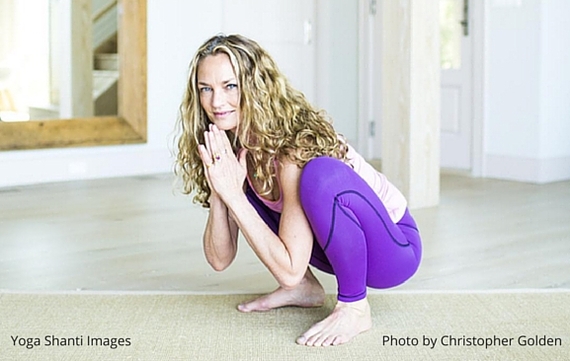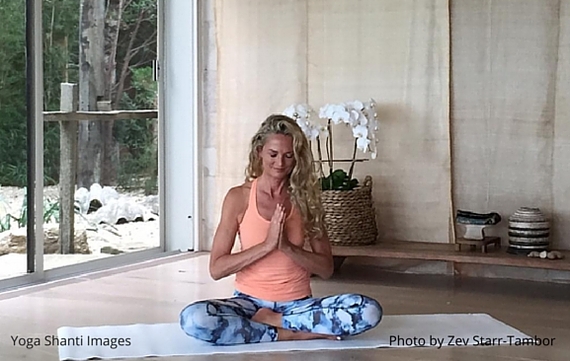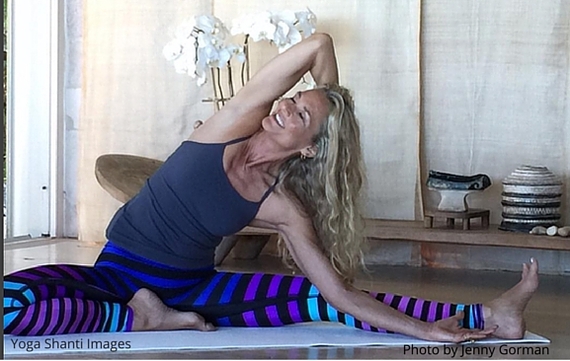Colleen Saidman Yee is an internationally renowned yoga teacher, who teaches yoga workshops worldwide with her husband, Rodney Yee. Before coming to yoga, Colleen had a varied career: She was a cover girl, a student of shiatsu, and she lived in Calcutta, working with Mother Theresa at the Home for the Dying and Destitute. More recently, together with Rodney, Colleen helped to create Urban Zen's Integrative Yoga Therapist Program, Donna Karan's worldwide initiative. Colleen is also the author of Yoga for Life - A Journey to Inner Peace and Freedom. In this interview, she discusses themes from her recent book, and the impact yoga has had on her life.
Q. Colleen, from the looks of it, you've had a charmed life--first a widely known supermodel, and now an internationally renowned yoga teacher teaching all over the world. The New York Times in one article even christened you "The First Lady of Yoga," in a recent profile.
But surprisingly, beneath the fairytale, you've had some pretty significant challenges! In your book, Yoga for Life, you write very openly and honestly about these. You have had to find your way through some serious health challenges: You got hit by lightning, were in a serious traffic accident, had PTSD, developed epilepsy, had a serious back injury--far more challenges than most people experience in a lifetime!
What did going through these challenges teach you, and how have they shaped your work as a yoga teacher today?
Colleen Saidman Yee: "Empathy" is the word that comes to mind. I can empathize with people's struggles, their difficulties, their shame, and their embarrassment, because these are all things that I have been through.
For example, I developed epilepsy after the lighting strike. That's an illness that is quite embarrassing, especially when it happens in front of a classroom of eighty people. Seizures are not sexy; I don't care how you paint them.
But I think dealing with those difficulties has made me a better teacher. We tell the teachers in our teacher training that unless you've overcome a difficult body or difficult situations, it's really hard to see where your students are.
As my husband Rodney says, those yoga students who have tighter bodies are going to be the best teachers, because they have more limitations and have to work extra hard to learn to overcome them. If someone is really flexible and doesn't understand the hindrances that the students have, it's really hard to teach them.
I feel like it's the same thing for me. I feel like I can work with veterans, with addicts, with those who have a disease that makes them feel vulnerable. I do believe that the challenges I've faced have helped me to be a more well-rounded teacher, friend and confidante.
Q. In your book you write about how you were struggling with a magnified version of the body image issues that most women experience. Most women would think that body image issues is not something a model would ever have to deal with?
Colleen Saidman Yee: Actually it's a constant companion. As a model, your whole life really is based on external appearances. People look at models and think, "Oh, they have it made. They're so lucky they look the way they do."
But the reality is that, as a model, you experience rejection every single day. If you knock on a thousand doors, maybe ten of them will open and say, "Yes, you look good for this job."
So it's very easy to start to believe that you are the shell that other people see, because that is what you are venerated for. And it goes past that. You get into the habit of thinking, "I'm going to be happy when..." As in, "I'm going to be happy when I have a perfect husband or if I have two children or if I have enough money..." And you're always waiting for that time that you're going to happy.
To be truly happy, there has to be a point of "I am enough." You can wait your whole life and never happen upon contentment. There has to be a point where we stop pretending that we're something other than what we are and building up more and more defenses.
That's one of the key lessons modeling taught me. Sometimes you just come to a point where you can't hold that pretense up anymore. And then you come to realize, "I'm far more than that." And for me, once I got to that point, I had to start unburying what I had spent so many years covering up.
Q. How did yoga help you in this process?
Colleen Saidman Yee: Yoga for me is a tool that brings you home. In life, when you start venturing too far away from that home inside of you, you lose yourself, you lose your center, and you feel like you're dying to plug back in. Yoga practice is what can help you plug back into that home, your true center.
Q. What inspires you to get to your mat every day, even on those days where you just don't feel like it, or don't feel you have time?
Colleen Saidman Yee: One big thing for me is the fact that yoga is a tool. With practice and consistency, you know what poses to put yourself in in order to affect the breath and relax the body. When we practice with these tools, we start to understand cause and effect. Over time, in some ways you just almost unconsciously take those tools out of your tool belt as you need them.
For example, if I'm teaching a very large group of people, I know I'm going to be nervous. I get nervous before every class; that's just the way it is. But I know what I need to do: I'm going to need to focus on my exhalation, especially the pause after the exhalation, in order to encourage relaxation. This is a very well-used tool in my belt; it doesn't let me down.
Q. We live in a culture where we are trained to interact with life through our intellect and mind, but we learn very little about relating to our bodies. In your experience, how can we get into deeper touch with our body and the wisdom of our body, both on the mat and off the mat?
Colleen Saidman Yee: I think that wisdom is always there, it's just a matter of uncovering it and learning to listen to it. Yoga asanas are very helpful in that regular yoga practice gets rid of some of the distractions of the body so that you can sit and do breath work and meditation.
And that's where the juice lies: when you start to become quiet enough in the brain, the stories that keep pulling us away from who we truly are begin to fade. The breath, sitting in meditation, and even the asana will bring you home, so that you can start to listen internally to the body.
Q: Yes. But it's such a subtle voice; it's easy to just shut it out and tell yourself that it's not there.
Colleen Saidman Yee: I think with yoga practice that voice gets louder, and it becomes more difficult not to listen to. I think that's one of the big advantages of all aspects of yoga practice: Asana, pranayama, breath work, and meditation.
As I say in my book, "Yoga is a muscle. The more you practice, the easier and more natural it becomes to create space to witness your internal turmoil and hold space for it."
Q: As a yoga teacher, what would you recommend to people who still are early on in their yoga practice and find it challenging to get motivated?
Colleen Saidman Yee: Don't put too high of an expectation on yourself. It's like with New Year's resolutions: They don't work, if you set your expectations far too high. If you say, "I'm going to practice yoga an hour a day; I'm going to lose twenty pounds in a month," it's too much, it won't work.
Make the expectation less. Make what you ask of yourself more reasonable. Turn off the TV ten minutes before you go to bed and do a Child's Pose. It only needs to take ten minutes of your day.
And over time, your body, your mind, and your spirit (if you believe in spirit) are going to crave more of that quality of experience. And gradually, it becomes something that you can't help but do for your own well-being. Yoga is not a punishment. It's not something with a stick. Yoga is nurturing.


